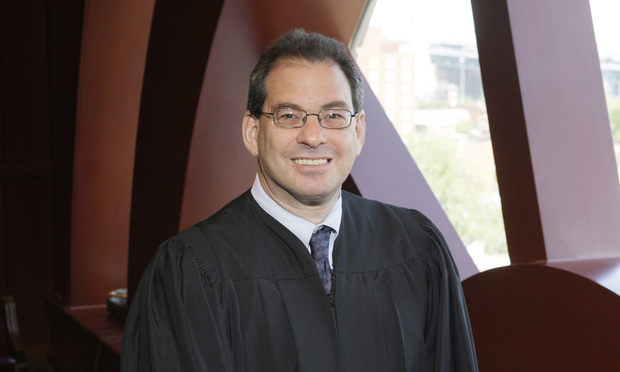'Counsel Must Accept the Good With the Bad': Judge Blocks Post-Settlement Withdrawal Bid in Benicar MDL
"If counsel is now 'scared off' by the prospect of paying for trial, counsel should not have undertaken the representation of plaintiff in the first instance," U.S. Magistrate Judge Joel Schneider said.
August 16, 2018 at 04:00 PM
4 minute read
 U.S. Magistrate Judge Joel Schneider
U.S. Magistrate Judge Joel Schneider
A federal judge in New Jersey issued a rebuke to lawyers from a plaintiffs firm over their attempt to withdraw from representing a client who seeks to litigate his suit over hypertension drug Benicar rather than join a settlement reached in the corresponding multidistrict litigation.
“If counsel is now 'scared off' by the prospect of paying for trial, counsel should not have undertaken the representation of plaintiff in the first instance,” U.S. Magistrate Judge Joel Schneider said in the case, McDaniel v. Daiichi Sankyo.
“The Court will not countenance a situation where a lawyer is permitted to abandon a client who chooses not to settle,” he added.
Lawyers from Kansas City's Wagstaff & Cartmell—Thomas Cartmell, Jeffrey Kuntz and David DeGreeff—moved to withdraw from representing client Terry McDaniel after he rejected terms of a $300 million settlement reached last year in multidistrict litigation in U.S. District Court in Camden, according to the decision.
The settlement resolved claims of more than 2,000 litigants, and McDaniel was one of only five litigants to opt out of the deal, according to the decision.
The lawyers contended that taking McDaniel's case to trial against Daiichi Sankyo and Forest Laboratories would burden them financially, and that the costs of trial would exceed the expected jury verdict.
In an Aug. 15 decision, Schneider denied the motion, saying that a withdrawal would be detrimental to McDaniel, who would be unlikely to find replacement counsel.
“An attorney does not have the right to withdraw as counsel for his or her client at his or her whim. 'A sudden disenchantment with a client or a cause is no basis for withdrawal,'” Schneider said, citing Rusinow v. Kamara, a 1996 District of New Jersey case.
An attorney's obligations and duties to a client, once representation is undertaken, “do not evaporate because the case becomes more complicated or work more arduous or a retainer not as profitable as first contemplated or imagined,” Schneider added, citing Kriegsman v. Kriegsman, a 1977 New Jersey Appellate Division case.
Schneider added that the Wagstaff & Cartmell lawyers are, or should be, knowledgeable about the facts in the case from the hundreds of plaintiffs they represented, whereas replacement counsel would need significant time to become familiar with the case. Courts in other cases have denied withdrawal motions on similar grounds, he said.
And an attorney's withdrawal in an MDL case “has particular potential to harm the administration of justice and become burdensome on the Court,” Schneider said. He cited In re FEMA Trailer Formaldehyde Products Liability Litigation, a 2011 decision from the Eastern District of Louisiana which said a withdrawal would bring administration of the MDL “to a grinding halt” as the court and defense counsel would be forced to take on the burden of locating and communicating with pro se plaintiffs.
Wagstaff & Cartmell said in court papers that bringing the case to trial would cost “hundreds of thousands of dollars” for expert reports, depositions, travel and lodging for a multiweek trial. The firm said its attorneys believe “these expenses will exceed any potential jury verdict in this matter, assuming Plaintiff even receives a verdict, leaving Movants with a potentially huge amount of unreimbursed expenses in addition to hundreds of hours of uncompensated attorney/paralegal time. This is particularly unreasonable given that Plaintiff's take-home portion from his projected settlement award most likely exceeds any amount he would ultimately walk away with from a jury award at trial, if Plaintiff receives anything at all.”
Schneider was unmoved: “The fact that hundreds of counsel's clients settled is undoubtedly lucrative,” the judge wrote. “Counsel must accept the good with the bad.”
The Wagstaff & Cartmell lawyers did not respond to requests for comment about the ruling. Susan Sharko of Drinker Biddle, who represents Daiichi Sankyo and Forest Laboratories in the case, didn't return a call. A Daiichi Sankyo spokeswoman, Kim Wix, said the company would not comment.
McDaniel, of Orlando, Florida, complained that he developed an intestinal disorder from taking the drug Benicar HCT, and he brought claims for a design defect and failure to warn users of the drug's side effects.
The $300 million settlement, reached in August 2017, applies to about 2,000 cases from across the nation that were consolidated as multidistrict litigation before Schneider and U.S. District Judge Robert Kugler, and another 100 cases that were pending in state Superior Court in Atlantic County, New Jersey. Only five plaintiffs from that group chose not to accept the settlement, including McDaniel, Schneider said.
This content has been archived. It is available through our partners, LexisNexis® and Bloomberg Law.
To view this content, please continue to their sites.
Not a Lexis Subscriber?
Subscribe Now
Not a Bloomberg Law Subscriber?
Subscribe Now
NOT FOR REPRINT
© 2025 ALM Global, LLC, All Rights Reserved. Request academic re-use from www.copyright.com. All other uses, submit a request to [email protected]. For more information visit Asset & Logo Licensing.
You Might Like
View All


First-of-Its-Kind Parkinson’s Patch at Center of Fight Over FDA Approval of Generic Version
3 minute read
Pharma Giants File Patent Infringement Suit Against India-Based Drugmaker Over IBS Medication
3 minute readTrending Stories
- 1Miami Attorneys Secure $4M Settlement Despite Insurance Limits
- 2NY Judge Admonished Over Contributions to Progressive Political Causes
- 3Legaltech Rundown: Alexi Launches an AI Litigation Tool, Hotshot Announces Private Equity Practice Courses, and More
- 46-48. It’s Comp Time Again: How To Crush Your Comp Memo
- 5'Religious Discrimination'?: 4th Circuit Revives Challenge to Employer Vaccine Mandate
Who Got The Work
Michael G. Bongiorno, Andrew Scott Dulberg and Elizabeth E. Driscoll from Wilmer Cutler Pickering Hale and Dorr have stepped in to represent Symbotic Inc., an A.I.-enabled technology platform that focuses on increasing supply chain efficiency, and other defendants in a pending shareholder derivative lawsuit. The case, filed Oct. 2 in Massachusetts District Court by the Brown Law Firm on behalf of Stephen Austen, accuses certain officers and directors of misleading investors in regard to Symbotic's potential for margin growth by failing to disclose that the company was not equipped to timely deploy its systems or manage expenses through project delays. The case, assigned to U.S. District Judge Nathaniel M. Gorton, is 1:24-cv-12522, Austen v. Cohen et al.
Who Got The Work
Edmund Polubinski and Marie Killmond of Davis Polk & Wardwell have entered appearances for data platform software development company MongoDB and other defendants in a pending shareholder derivative lawsuit. The action, filed Oct. 7 in New York Southern District Court by the Brown Law Firm, accuses the company's directors and/or officers of falsely expressing confidence in the company’s restructuring of its sales incentive plan and downplaying the severity of decreases in its upfront commitments. The case is 1:24-cv-07594, Roy v. Ittycheria et al.
Who Got The Work
Amy O. Bruchs and Kurt F. Ellison of Michael Best & Friedrich have entered appearances for Epic Systems Corp. in a pending employment discrimination lawsuit. The suit was filed Sept. 7 in Wisconsin Western District Court by Levine Eisberner LLC and Siri & Glimstad on behalf of a project manager who claims that he was wrongfully terminated after applying for a religious exemption to the defendant's COVID-19 vaccine mandate. The case, assigned to U.S. Magistrate Judge Anita Marie Boor, is 3:24-cv-00630, Secker, Nathan v. Epic Systems Corporation.
Who Got The Work
David X. Sullivan, Thomas J. Finn and Gregory A. Hall from McCarter & English have entered appearances for Sunrun Installation Services in a pending civil rights lawsuit. The complaint was filed Sept. 4 in Connecticut District Court by attorney Robert M. Berke on behalf of former employee George Edward Steins, who was arrested and charged with employing an unregistered home improvement salesperson. The complaint alleges that had Sunrun informed the Connecticut Department of Consumer Protection that the plaintiff's employment had ended in 2017 and that he no longer held Sunrun's home improvement contractor license, he would not have been hit with charges, which were dismissed in May 2024. The case, assigned to U.S. District Judge Jeffrey A. Meyer, is 3:24-cv-01423, Steins v. Sunrun, Inc. et al.
Who Got The Work
Greenberg Traurig shareholder Joshua L. Raskin has entered an appearance for boohoo.com UK Ltd. in a pending patent infringement lawsuit. The suit, filed Sept. 3 in Texas Eastern District Court by Rozier Hardt McDonough on behalf of Alto Dynamics, asserts five patents related to an online shopping platform. The case, assigned to U.S. District Judge Rodney Gilstrap, is 2:24-cv-00719, Alto Dynamics, LLC v. boohoo.com UK Limited.
Featured Firms
Law Offices of Gary Martin Hays & Associates, P.C.
(470) 294-1674
Law Offices of Mark E. Salomone
(857) 444-6468
Smith & Hassler
(713) 739-1250






